Analyzing Industrial Disasters and Neoliberal Policies on Governments
VerifiedAdded on 2021/09/30
|16
|4620
|113
Essay
AI Summary
This essay delves into the intricate relationship between industrial disasters, particularly the Bhopal disaster, and the implementation of neoliberal policies by various world institutions and their effects on Western governments. It begins by defining neoliberalism, tracing its origins, and outlining its core principles, such as free markets and reduced government intervention. The essay then provides an overview of the Bhopal disaster, detailing the events that led to the tragedy and its devastating consequences. The core argument examines how neoliberal policies, emphasizing free trade and deregulation, were either exacerbated by or influenced by the disaster. It analyzes the roles of the World Bank and the International Monetary Fund in promoting these policies and their subsequent impact on the economic landscape, especially in developing countries like India. The essay explores the contradictions and challenges inherent in neoliberalism, particularly in the context of industrial disasters, and assesses the responses of Western governments in shaping the economic scenario and imposing policies to manage the consequences. The analysis highlights the complex interplay between economic ideologies, industrial accidents, and governmental responses, emphasizing the far-reaching implications of neoliberal policies in the face of such crises.
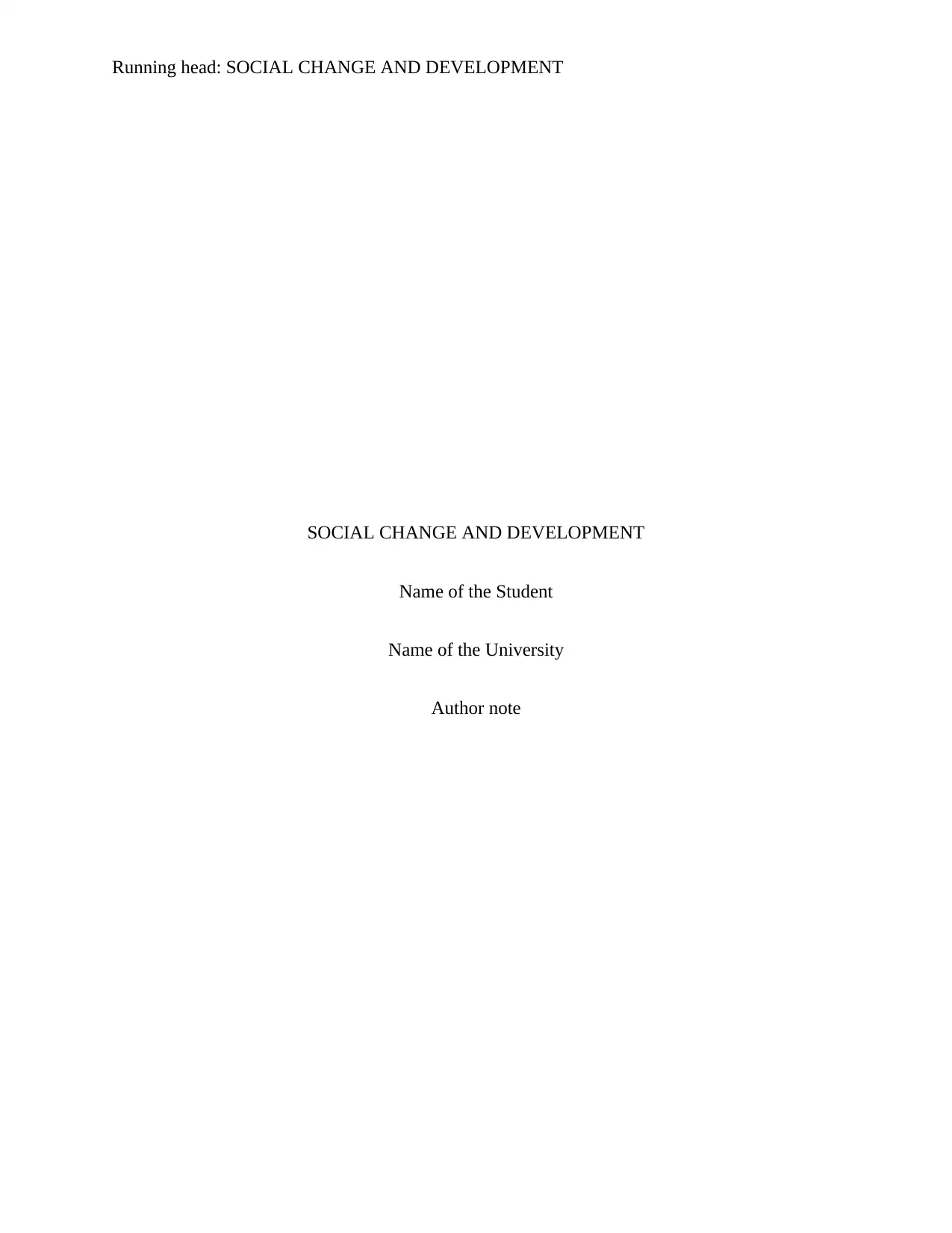
Running head: SOCIAL CHANGE AND DEVELOPMENT
SOCIAL CHANGE AND DEVELOPMENT
Name of the Student
Name of the University
Author note
SOCIAL CHANGE AND DEVELOPMENT
Name of the Student
Name of the University
Author note
Paraphrase This Document
Need a fresh take? Get an instant paraphrase of this document with our AI Paraphraser
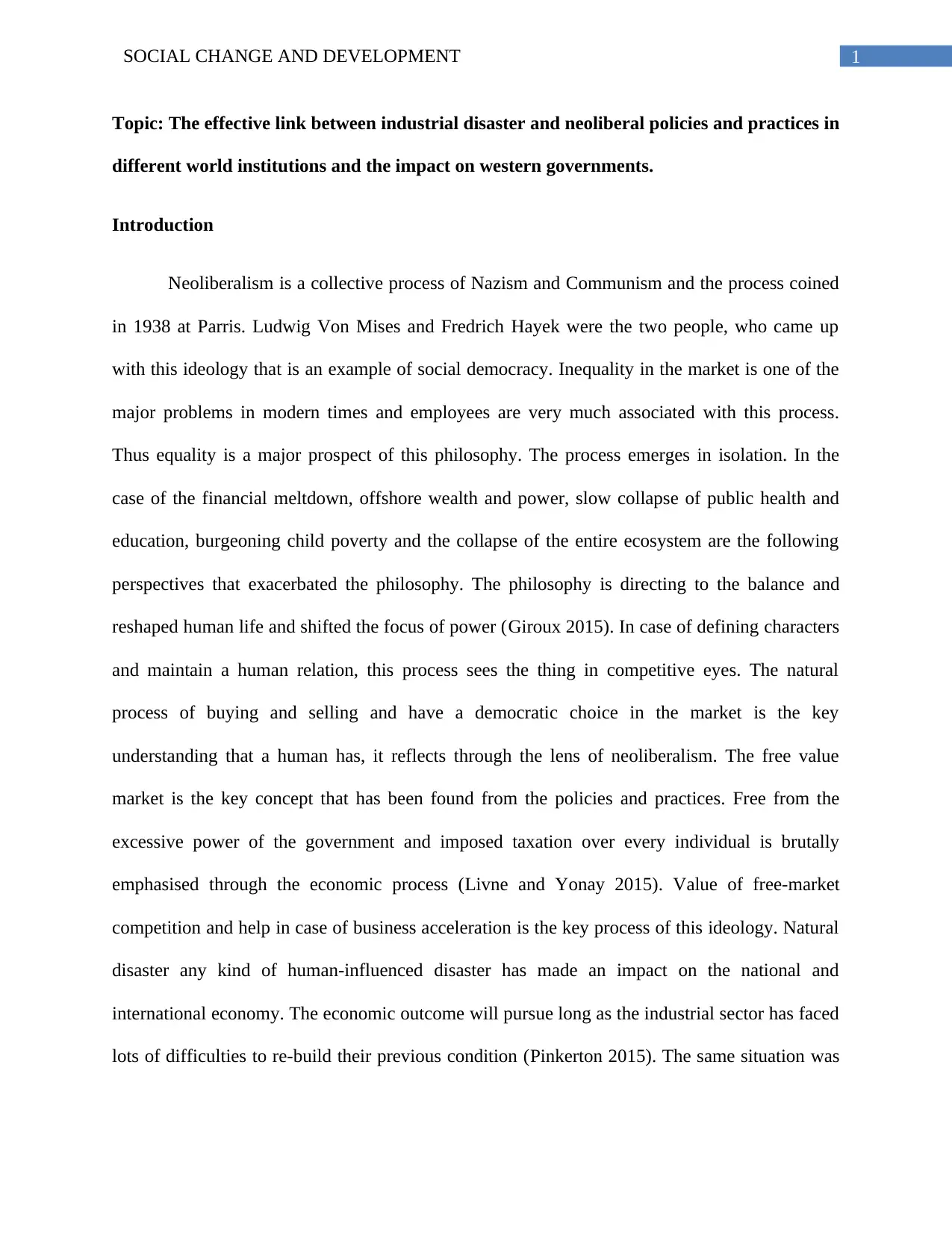
1SOCIAL CHANGE AND DEVELOPMENT
Topic: The effective link between industrial disaster and neoliberal policies and practices in
different world institutions and the impact on western governments.
Introduction
Neoliberalism is a collective process of Nazism and Communism and the process coined
in 1938 at Parris. Ludwig Von Mises and Fredrich Hayek were the two people, who came up
with this ideology that is an example of social democracy. Inequality in the market is one of the
major problems in modern times and employees are very much associated with this process.
Thus equality is a major prospect of this philosophy. The process emerges in isolation. In the
case of the financial meltdown, offshore wealth and power, slow collapse of public health and
education, burgeoning child poverty and the collapse of the entire ecosystem are the following
perspectives that exacerbated the philosophy. The philosophy is directing to the balance and
reshaped human life and shifted the focus of power (Giroux 2015). In case of defining characters
and maintain a human relation, this process sees the thing in competitive eyes. The natural
process of buying and selling and have a democratic choice in the market is the key
understanding that a human has, it reflects through the lens of neoliberalism. The free value
market is the key concept that has been found from the policies and practices. Free from the
excessive power of the government and imposed taxation over every individual is brutally
emphasised through the economic process (Livne and Yonay 2015). Value of free-market
competition and help in case of business acceleration is the key process of this ideology. Natural
disaster any kind of human-influenced disaster has made an impact on the national and
international economy. The economic outcome will pursue long as the industrial sector has faced
lots of difficulties to re-build their previous condition (Pinkerton 2015). The same situation was
Topic: The effective link between industrial disaster and neoliberal policies and practices in
different world institutions and the impact on western governments.
Introduction
Neoliberalism is a collective process of Nazism and Communism and the process coined
in 1938 at Parris. Ludwig Von Mises and Fredrich Hayek were the two people, who came up
with this ideology that is an example of social democracy. Inequality in the market is one of the
major problems in modern times and employees are very much associated with this process.
Thus equality is a major prospect of this philosophy. The process emerges in isolation. In the
case of the financial meltdown, offshore wealth and power, slow collapse of public health and
education, burgeoning child poverty and the collapse of the entire ecosystem are the following
perspectives that exacerbated the philosophy. The philosophy is directing to the balance and
reshaped human life and shifted the focus of power (Giroux 2015). In case of defining characters
and maintain a human relation, this process sees the thing in competitive eyes. The natural
process of buying and selling and have a democratic choice in the market is the key
understanding that a human has, it reflects through the lens of neoliberalism. The free value
market is the key concept that has been found from the policies and practices. Free from the
excessive power of the government and imposed taxation over every individual is brutally
emphasised through the economic process (Livne and Yonay 2015). Value of free-market
competition and help in case of business acceleration is the key process of this ideology. Natural
disaster any kind of human-influenced disaster has made an impact on the national and
international economy. The economic outcome will pursue long as the industrial sector has faced
lots of difficulties to re-build their previous condition (Pinkerton 2015). The same situation was
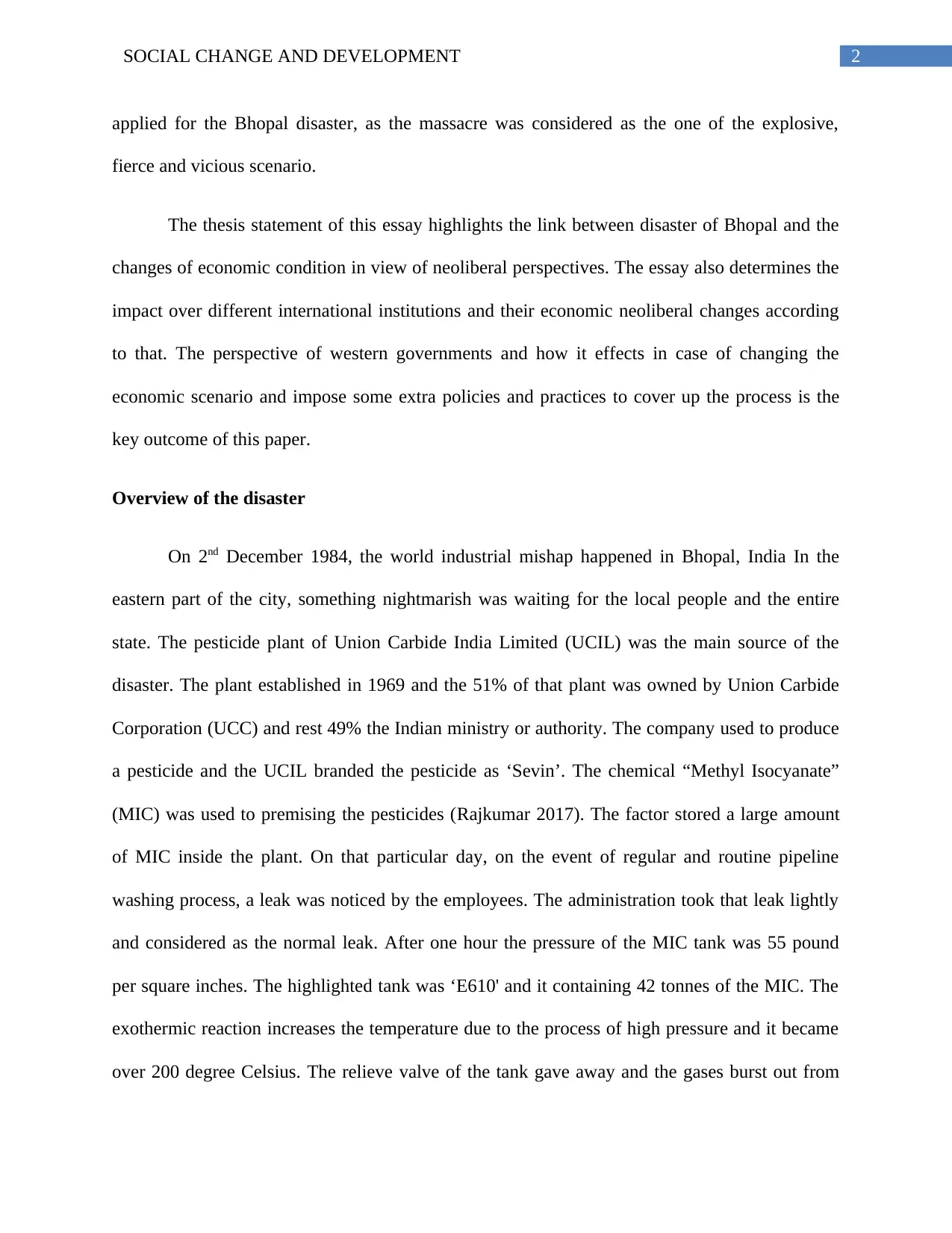
2SOCIAL CHANGE AND DEVELOPMENT
applied for the Bhopal disaster, as the massacre was considered as the one of the explosive,
fierce and vicious scenario.
The thesis statement of this essay highlights the link between disaster of Bhopal and the
changes of economic condition in view of neoliberal perspectives. The essay also determines the
impact over different international institutions and their economic neoliberal changes according
to that. The perspective of western governments and how it effects in case of changing the
economic scenario and impose some extra policies and practices to cover up the process is the
key outcome of this paper.
Overview of the disaster
On 2nd December 1984, the world industrial mishap happened in Bhopal, India In the
eastern part of the city, something nightmarish was waiting for the local people and the entire
state. The pesticide plant of Union Carbide India Limited (UCIL) was the main source of the
disaster. The plant established in 1969 and the 51% of that plant was owned by Union Carbide
Corporation (UCC) and rest 49% the Indian ministry or authority. The company used to produce
a pesticide and the UCIL branded the pesticide as ‘Sevin’. The chemical “Methyl Isocyanate”
(MIC) was used to premising the pesticides (Rajkumar 2017). The factor stored a large amount
of MIC inside the plant. On that particular day, on the event of regular and routine pipeline
washing process, a leak was noticed by the employees. The administration took that leak lightly
and considered as the normal leak. After one hour the pressure of the MIC tank was 55 pound
per square inches. The highlighted tank was ‘E610' and it containing 42 tonnes of the MIC. The
exothermic reaction increases the temperature due to the process of high pressure and it became
over 200 degree Celsius. The relieve valve of the tank gave away and the gases burst out from
applied for the Bhopal disaster, as the massacre was considered as the one of the explosive,
fierce and vicious scenario.
The thesis statement of this essay highlights the link between disaster of Bhopal and the
changes of economic condition in view of neoliberal perspectives. The essay also determines the
impact over different international institutions and their economic neoliberal changes according
to that. The perspective of western governments and how it effects in case of changing the
economic scenario and impose some extra policies and practices to cover up the process is the
key outcome of this paper.
Overview of the disaster
On 2nd December 1984, the world industrial mishap happened in Bhopal, India In the
eastern part of the city, something nightmarish was waiting for the local people and the entire
state. The pesticide plant of Union Carbide India Limited (UCIL) was the main source of the
disaster. The plant established in 1969 and the 51% of that plant was owned by Union Carbide
Corporation (UCC) and rest 49% the Indian ministry or authority. The company used to produce
a pesticide and the UCIL branded the pesticide as ‘Sevin’. The chemical “Methyl Isocyanate”
(MIC) was used to premising the pesticides (Rajkumar 2017). The factor stored a large amount
of MIC inside the plant. On that particular day, on the event of regular and routine pipeline
washing process, a leak was noticed by the employees. The administration took that leak lightly
and considered as the normal leak. After one hour the pressure of the MIC tank was 55 pound
per square inches. The highlighted tank was ‘E610' and it containing 42 tonnes of the MIC. The
exothermic reaction increases the temperature due to the process of high pressure and it became
over 200 degree Celsius. The relieve valve of the tank gave away and the gases burst out from
⊘ This is a preview!⊘
Do you want full access?
Subscribe today to unlock all pages.

Trusted by 1+ million students worldwide
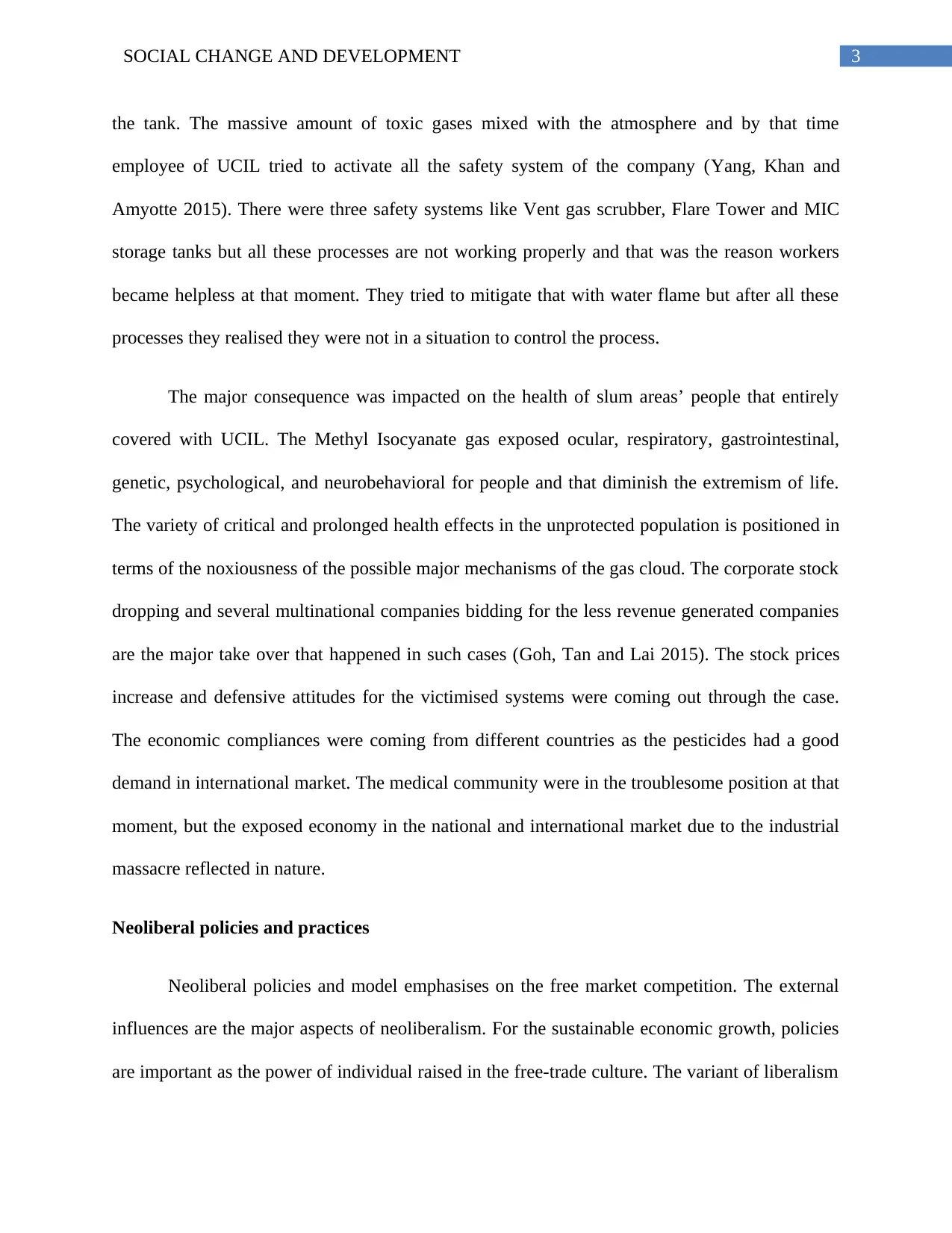
3SOCIAL CHANGE AND DEVELOPMENT
the tank. The massive amount of toxic gases mixed with the atmosphere and by that time
employee of UCIL tried to activate all the safety system of the company (Yang, Khan and
Amyotte 2015). There were three safety systems like Vent gas scrubber, Flare Tower and MIC
storage tanks but all these processes are not working properly and that was the reason workers
became helpless at that moment. They tried to mitigate that with water flame but after all these
processes they realised they were not in a situation to control the process.
The major consequence was impacted on the health of slum areas’ people that entirely
covered with UCIL. The Methyl Isocyanate gas exposed ocular, respiratory, gastrointestinal,
genetic, psychological, and neurobehavioral for people and that diminish the extremism of life.
The variety of critical and prolonged health effects in the unprotected population is positioned in
terms of the noxiousness of the possible major mechanisms of the gas cloud. The corporate stock
dropping and several multinational companies bidding for the less revenue generated companies
are the major take over that happened in such cases (Goh, Tan and Lai 2015). The stock prices
increase and defensive attitudes for the victimised systems were coming out through the case.
The economic compliances were coming from different countries as the pesticides had a good
demand in international market. The medical community were in the troublesome position at that
moment, but the exposed economy in the national and international market due to the industrial
massacre reflected in nature.
Neoliberal policies and practices
Neoliberal policies and model emphasises on the free market competition. The external
influences are the major aspects of neoliberalism. For the sustainable economic growth, policies
are important as the power of individual raised in the free-trade culture. The variant of liberalism
the tank. The massive amount of toxic gases mixed with the atmosphere and by that time
employee of UCIL tried to activate all the safety system of the company (Yang, Khan and
Amyotte 2015). There were three safety systems like Vent gas scrubber, Flare Tower and MIC
storage tanks but all these processes are not working properly and that was the reason workers
became helpless at that moment. They tried to mitigate that with water flame but after all these
processes they realised they were not in a situation to control the process.
The major consequence was impacted on the health of slum areas’ people that entirely
covered with UCIL. The Methyl Isocyanate gas exposed ocular, respiratory, gastrointestinal,
genetic, psychological, and neurobehavioral for people and that diminish the extremism of life.
The variety of critical and prolonged health effects in the unprotected population is positioned in
terms of the noxiousness of the possible major mechanisms of the gas cloud. The corporate stock
dropping and several multinational companies bidding for the less revenue generated companies
are the major take over that happened in such cases (Goh, Tan and Lai 2015). The stock prices
increase and defensive attitudes for the victimised systems were coming out through the case.
The economic compliances were coming from different countries as the pesticides had a good
demand in international market. The medical community were in the troublesome position at that
moment, but the exposed economy in the national and international market due to the industrial
massacre reflected in nature.
Neoliberal policies and practices
Neoliberal policies and model emphasises on the free market competition. The external
influences are the major aspects of neoliberalism. For the sustainable economic growth, policies
are important as the power of individual raised in the free-trade culture. The variant of liberalism
Paraphrase This Document
Need a fresh take? Get an instant paraphrase of this document with our AI Paraphraser
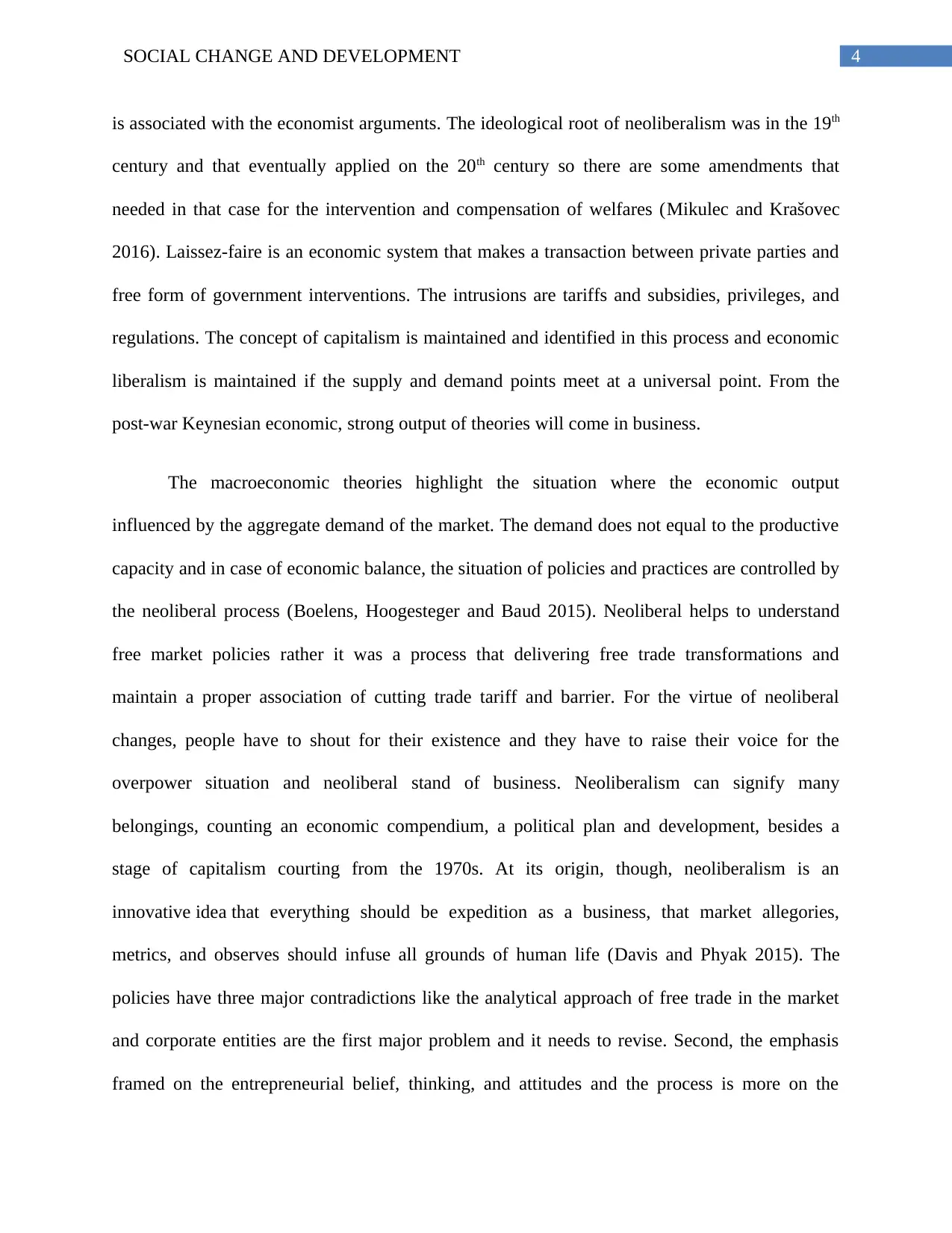
4SOCIAL CHANGE AND DEVELOPMENT
is associated with the economist arguments. The ideological root of neoliberalism was in the 19th
century and that eventually applied on the 20th century so there are some amendments that
needed in that case for the intervention and compensation of welfares (Mikulec and Krašovec
2016). Laissez-faire is an economic system that makes a transaction between private parties and
free form of government interventions. The intrusions are tariffs and subsidies, privileges, and
regulations. The concept of capitalism is maintained and identified in this process and economic
liberalism is maintained if the supply and demand points meet at a universal point. From the
post-war Keynesian economic, strong output of theories will come in business.
The macroeconomic theories highlight the situation where the economic output
influenced by the aggregate demand of the market. The demand does not equal to the productive
capacity and in case of economic balance, the situation of policies and practices are controlled by
the neoliberal process (Boelens, Hoogesteger and Baud 2015). Neoliberal helps to understand
free market policies rather it was a process that delivering free trade transformations and
maintain a proper association of cutting trade tariff and barrier. For the virtue of neoliberal
changes, people have to shout for their existence and they have to raise their voice for the
overpower situation and neoliberal stand of business. Neoliberalism can signify many
belongings, counting an economic compendium, a political plan and development, besides a
stage of capitalism courting from the 1970s. At its origin, though, neoliberalism is an
innovative idea that everything should be expedition as a business, that market allegories,
metrics, and observes should infuse all grounds of human life (Davis and Phyak 2015). The
policies have three major contradictions like the analytical approach of free trade in the market
and corporate entities are the first major problem and it needs to revise. Second, the emphasis
framed on the entrepreneurial belief, thinking, and attitudes and the process is more on the
is associated with the economist arguments. The ideological root of neoliberalism was in the 19th
century and that eventually applied on the 20th century so there are some amendments that
needed in that case for the intervention and compensation of welfares (Mikulec and Krašovec
2016). Laissez-faire is an economic system that makes a transaction between private parties and
free form of government interventions. The intrusions are tariffs and subsidies, privileges, and
regulations. The concept of capitalism is maintained and identified in this process and economic
liberalism is maintained if the supply and demand points meet at a universal point. From the
post-war Keynesian economic, strong output of theories will come in business.
The macroeconomic theories highlight the situation where the economic output
influenced by the aggregate demand of the market. The demand does not equal to the productive
capacity and in case of economic balance, the situation of policies and practices are controlled by
the neoliberal process (Boelens, Hoogesteger and Baud 2015). Neoliberal helps to understand
free market policies rather it was a process that delivering free trade transformations and
maintain a proper association of cutting trade tariff and barrier. For the virtue of neoliberal
changes, people have to shout for their existence and they have to raise their voice for the
overpower situation and neoliberal stand of business. Neoliberalism can signify many
belongings, counting an economic compendium, a political plan and development, besides a
stage of capitalism courting from the 1970s. At its origin, though, neoliberalism is an
innovative idea that everything should be expedition as a business, that market allegories,
metrics, and observes should infuse all grounds of human life (Davis and Phyak 2015). The
policies have three major contradictions like the analytical approach of free trade in the market
and corporate entities are the first major problem and it needs to revise. Second, the emphasis
framed on the entrepreneurial belief, thinking, and attitudes and the process is more on the
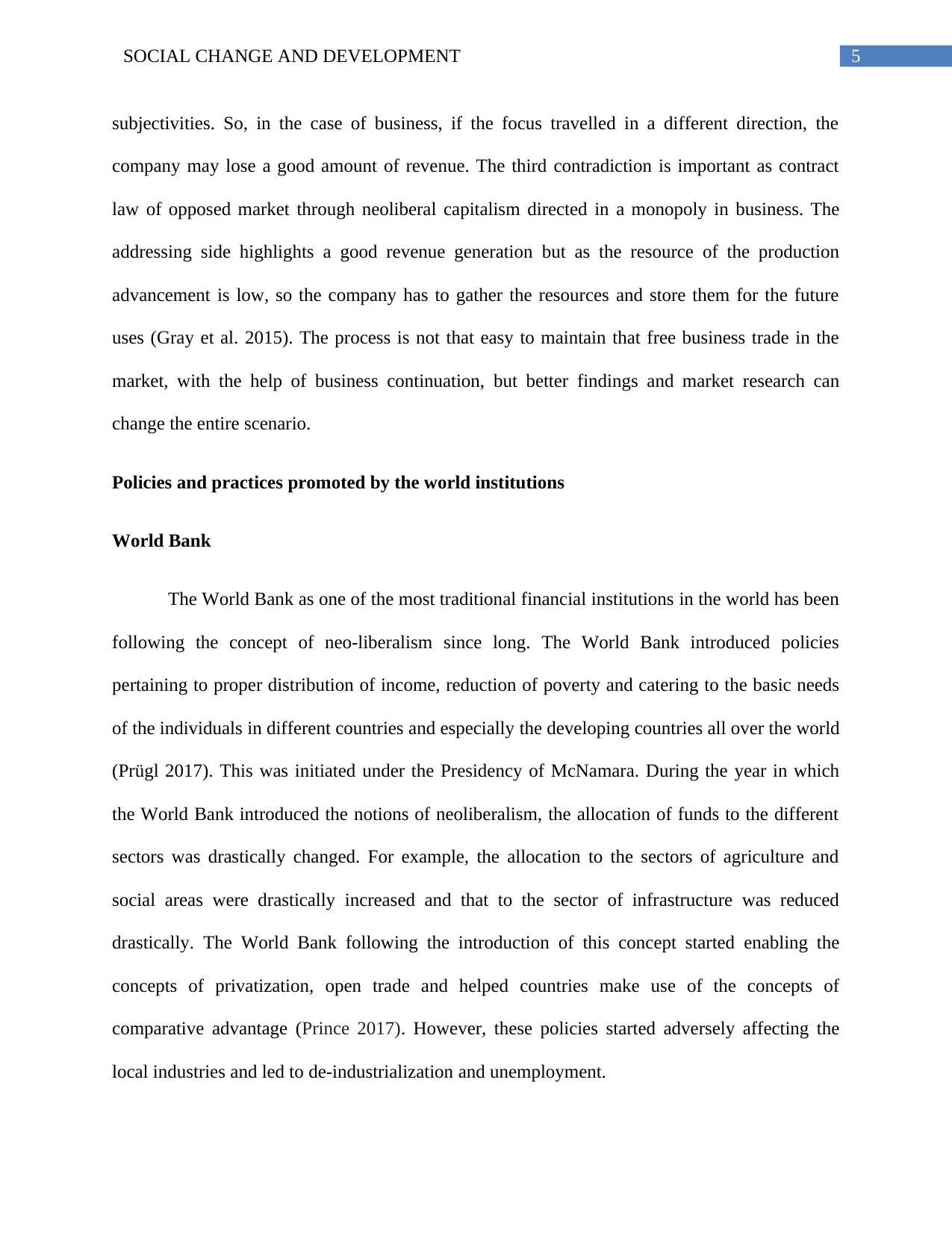
5SOCIAL CHANGE AND DEVELOPMENT
subjectivities. So, in the case of business, if the focus travelled in a different direction, the
company may lose a good amount of revenue. The third contradiction is important as contract
law of opposed market through neoliberal capitalism directed in a monopoly in business. The
addressing side highlights a good revenue generation but as the resource of the production
advancement is low, so the company has to gather the resources and store them for the future
uses (Gray et al. 2015). The process is not that easy to maintain that free business trade in the
market, with the help of business continuation, but better findings and market research can
change the entire scenario.
Policies and practices promoted by the world institutions
World Bank
The World Bank as one of the most traditional financial institutions in the world has been
following the concept of neo-liberalism since long. The World Bank introduced policies
pertaining to proper distribution of income, reduction of poverty and catering to the basic needs
of the individuals in different countries and especially the developing countries all over the world
(Prügl 2017). This was initiated under the Presidency of McNamara. During the year in which
the World Bank introduced the notions of neoliberalism, the allocation of funds to the different
sectors was drastically changed. For example, the allocation to the sectors of agriculture and
social areas were drastically increased and that to the sector of infrastructure was reduced
drastically. The World Bank following the introduction of this concept started enabling the
concepts of privatization, open trade and helped countries make use of the concepts of
comparative advantage (Prince 2017). However, these policies started adversely affecting the
local industries and led to de-industrialization and unemployment.
subjectivities. So, in the case of business, if the focus travelled in a different direction, the
company may lose a good amount of revenue. The third contradiction is important as contract
law of opposed market through neoliberal capitalism directed in a monopoly in business. The
addressing side highlights a good revenue generation but as the resource of the production
advancement is low, so the company has to gather the resources and store them for the future
uses (Gray et al. 2015). The process is not that easy to maintain that free business trade in the
market, with the help of business continuation, but better findings and market research can
change the entire scenario.
Policies and practices promoted by the world institutions
World Bank
The World Bank as one of the most traditional financial institutions in the world has been
following the concept of neo-liberalism since long. The World Bank introduced policies
pertaining to proper distribution of income, reduction of poverty and catering to the basic needs
of the individuals in different countries and especially the developing countries all over the world
(Prügl 2017). This was initiated under the Presidency of McNamara. During the year in which
the World Bank introduced the notions of neoliberalism, the allocation of funds to the different
sectors was drastically changed. For example, the allocation to the sectors of agriculture and
social areas were drastically increased and that to the sector of infrastructure was reduced
drastically. The World Bank following the introduction of this concept started enabling the
concepts of privatization, open trade and helped countries make use of the concepts of
comparative advantage (Prince 2017). However, these policies started adversely affecting the
local industries and led to de-industrialization and unemployment.
⊘ This is a preview!⊘
Do you want full access?
Subscribe today to unlock all pages.

Trusted by 1+ million students worldwide
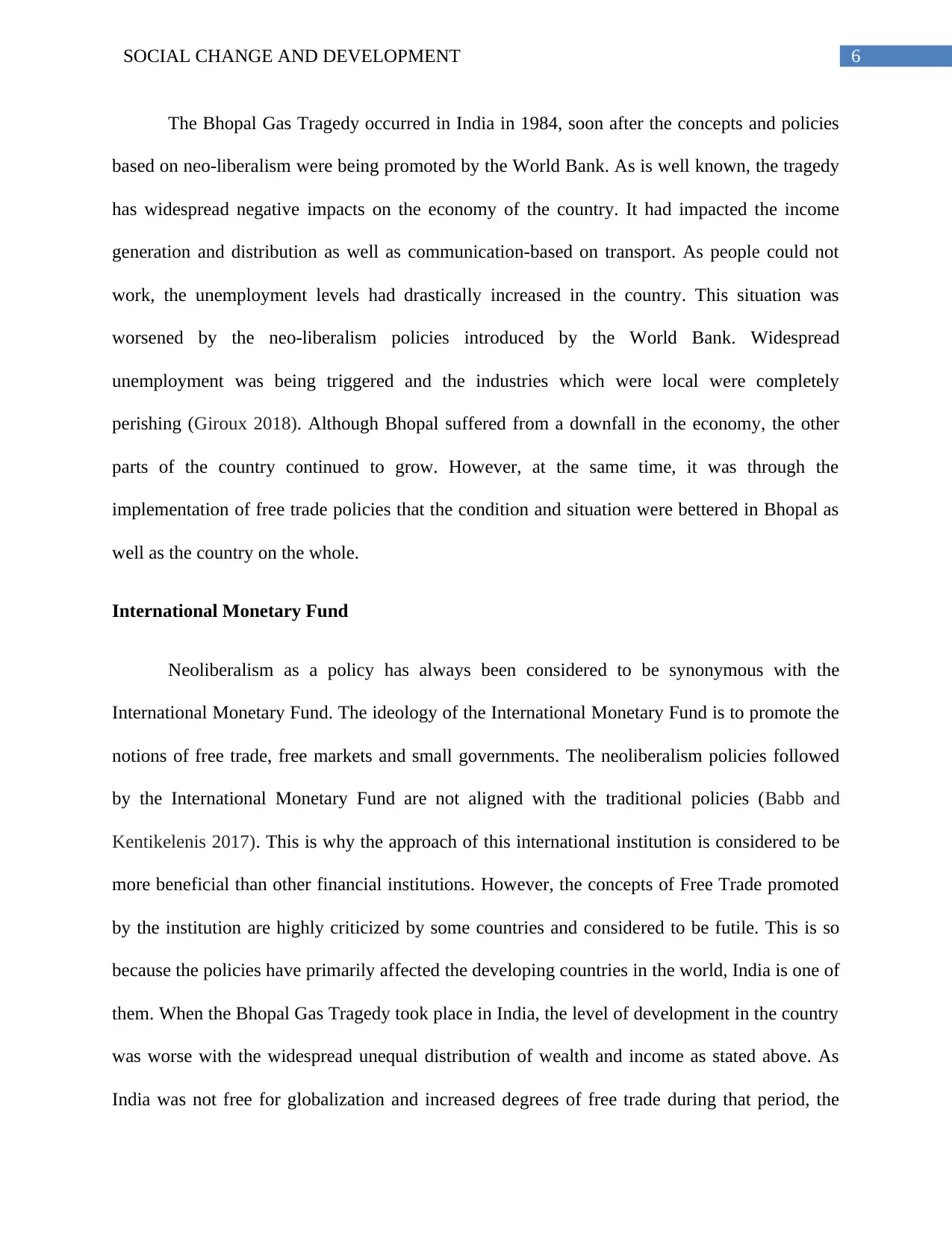
6SOCIAL CHANGE AND DEVELOPMENT
The Bhopal Gas Tragedy occurred in India in 1984, soon after the concepts and policies
based on neo-liberalism were being promoted by the World Bank. As is well known, the tragedy
has widespread negative impacts on the economy of the country. It had impacted the income
generation and distribution as well as communication-based on transport. As people could not
work, the unemployment levels had drastically increased in the country. This situation was
worsened by the neo-liberalism policies introduced by the World Bank. Widespread
unemployment was being triggered and the industries which were local were completely
perishing (Giroux 2018). Although Bhopal suffered from a downfall in the economy, the other
parts of the country continued to grow. However, at the same time, it was through the
implementation of free trade policies that the condition and situation were bettered in Bhopal as
well as the country on the whole.
International Monetary Fund
Neoliberalism as a policy has always been considered to be synonymous with the
International Monetary Fund. The ideology of the International Monetary Fund is to promote the
notions of free trade, free markets and small governments. The neoliberalism policies followed
by the International Monetary Fund are not aligned with the traditional policies (Babb and
Kentikelenis 2017). This is why the approach of this international institution is considered to be
more beneficial than other financial institutions. However, the concepts of Free Trade promoted
by the institution are highly criticized by some countries and considered to be futile. This is so
because the policies have primarily affected the developing countries in the world, India is one of
them. When the Bhopal Gas Tragedy took place in India, the level of development in the country
was worse with the widespread unequal distribution of wealth and income as stated above. As
India was not free for globalization and increased degrees of free trade during that period, the
The Bhopal Gas Tragedy occurred in India in 1984, soon after the concepts and policies
based on neo-liberalism were being promoted by the World Bank. As is well known, the tragedy
has widespread negative impacts on the economy of the country. It had impacted the income
generation and distribution as well as communication-based on transport. As people could not
work, the unemployment levels had drastically increased in the country. This situation was
worsened by the neo-liberalism policies introduced by the World Bank. Widespread
unemployment was being triggered and the industries which were local were completely
perishing (Giroux 2018). Although Bhopal suffered from a downfall in the economy, the other
parts of the country continued to grow. However, at the same time, it was through the
implementation of free trade policies that the condition and situation were bettered in Bhopal as
well as the country on the whole.
International Monetary Fund
Neoliberalism as a policy has always been considered to be synonymous with the
International Monetary Fund. The ideology of the International Monetary Fund is to promote the
notions of free trade, free markets and small governments. The neoliberalism policies followed
by the International Monetary Fund are not aligned with the traditional policies (Babb and
Kentikelenis 2017). This is why the approach of this international institution is considered to be
more beneficial than other financial institutions. However, the concepts of Free Trade promoted
by the institution are highly criticized by some countries and considered to be futile. This is so
because the policies have primarily affected the developing countries in the world, India is one of
them. When the Bhopal Gas Tragedy took place in India, the level of development in the country
was worse with the widespread unequal distribution of wealth and income as stated above. As
India was not free for globalization and increased degrees of free trade during that period, the
Paraphrase This Document
Need a fresh take? Get an instant paraphrase of this document with our AI Paraphraser
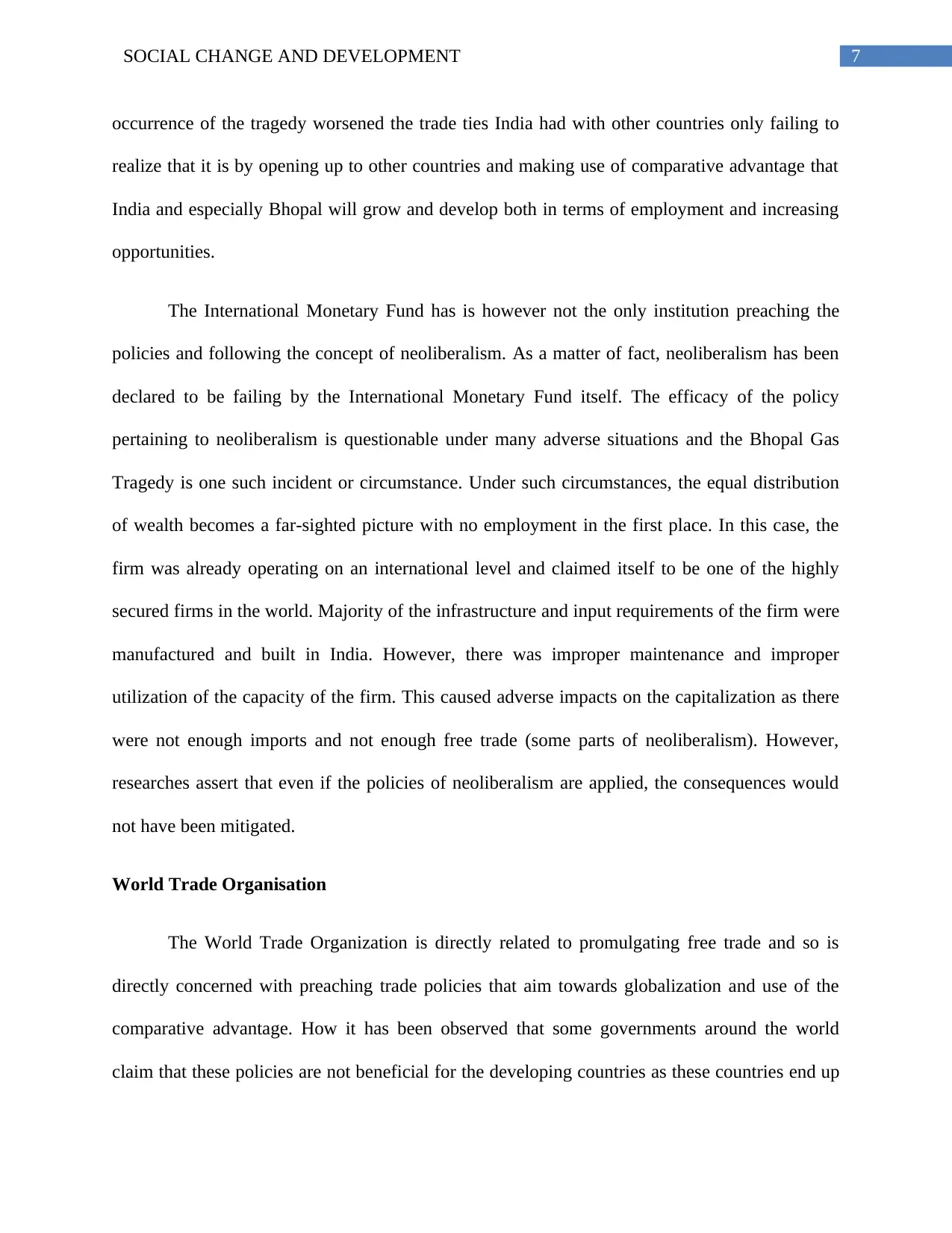
7SOCIAL CHANGE AND DEVELOPMENT
occurrence of the tragedy worsened the trade ties India had with other countries only failing to
realize that it is by opening up to other countries and making use of comparative advantage that
India and especially Bhopal will grow and develop both in terms of employment and increasing
opportunities.
The International Monetary Fund has is however not the only institution preaching the
policies and following the concept of neoliberalism. As a matter of fact, neoliberalism has been
declared to be failing by the International Monetary Fund itself. The efficacy of the policy
pertaining to neoliberalism is questionable under many adverse situations and the Bhopal Gas
Tragedy is one such incident or circumstance. Under such circumstances, the equal distribution
of wealth becomes a far-sighted picture with no employment in the first place. In this case, the
firm was already operating on an international level and claimed itself to be one of the highly
secured firms in the world. Majority of the infrastructure and input requirements of the firm were
manufactured and built in India. However, there was improper maintenance and improper
utilization of the capacity of the firm. This caused adverse impacts on the capitalization as there
were not enough imports and not enough free trade (some parts of neoliberalism). However,
researches assert that even if the policies of neoliberalism are applied, the consequences would
not have been mitigated.
World Trade Organisation
The World Trade Organization is directly related to promulgating free trade and so is
directly concerned with preaching trade policies that aim towards globalization and use of the
comparative advantage. How it has been observed that some governments around the world
claim that these policies are not beneficial for the developing countries as these countries end up
occurrence of the tragedy worsened the trade ties India had with other countries only failing to
realize that it is by opening up to other countries and making use of comparative advantage that
India and especially Bhopal will grow and develop both in terms of employment and increasing
opportunities.
The International Monetary Fund has is however not the only institution preaching the
policies and following the concept of neoliberalism. As a matter of fact, neoliberalism has been
declared to be failing by the International Monetary Fund itself. The efficacy of the policy
pertaining to neoliberalism is questionable under many adverse situations and the Bhopal Gas
Tragedy is one such incident or circumstance. Under such circumstances, the equal distribution
of wealth becomes a far-sighted picture with no employment in the first place. In this case, the
firm was already operating on an international level and claimed itself to be one of the highly
secured firms in the world. Majority of the infrastructure and input requirements of the firm were
manufactured and built in India. However, there was improper maintenance and improper
utilization of the capacity of the firm. This caused adverse impacts on the capitalization as there
were not enough imports and not enough free trade (some parts of neoliberalism). However,
researches assert that even if the policies of neoliberalism are applied, the consequences would
not have been mitigated.
World Trade Organisation
The World Trade Organization is directly related to promulgating free trade and so is
directly concerned with preaching trade policies that aim towards globalization and use of the
comparative advantage. How it has been observed that some governments around the world
claim that these policies are not beneficial for the developing countries as these countries end up
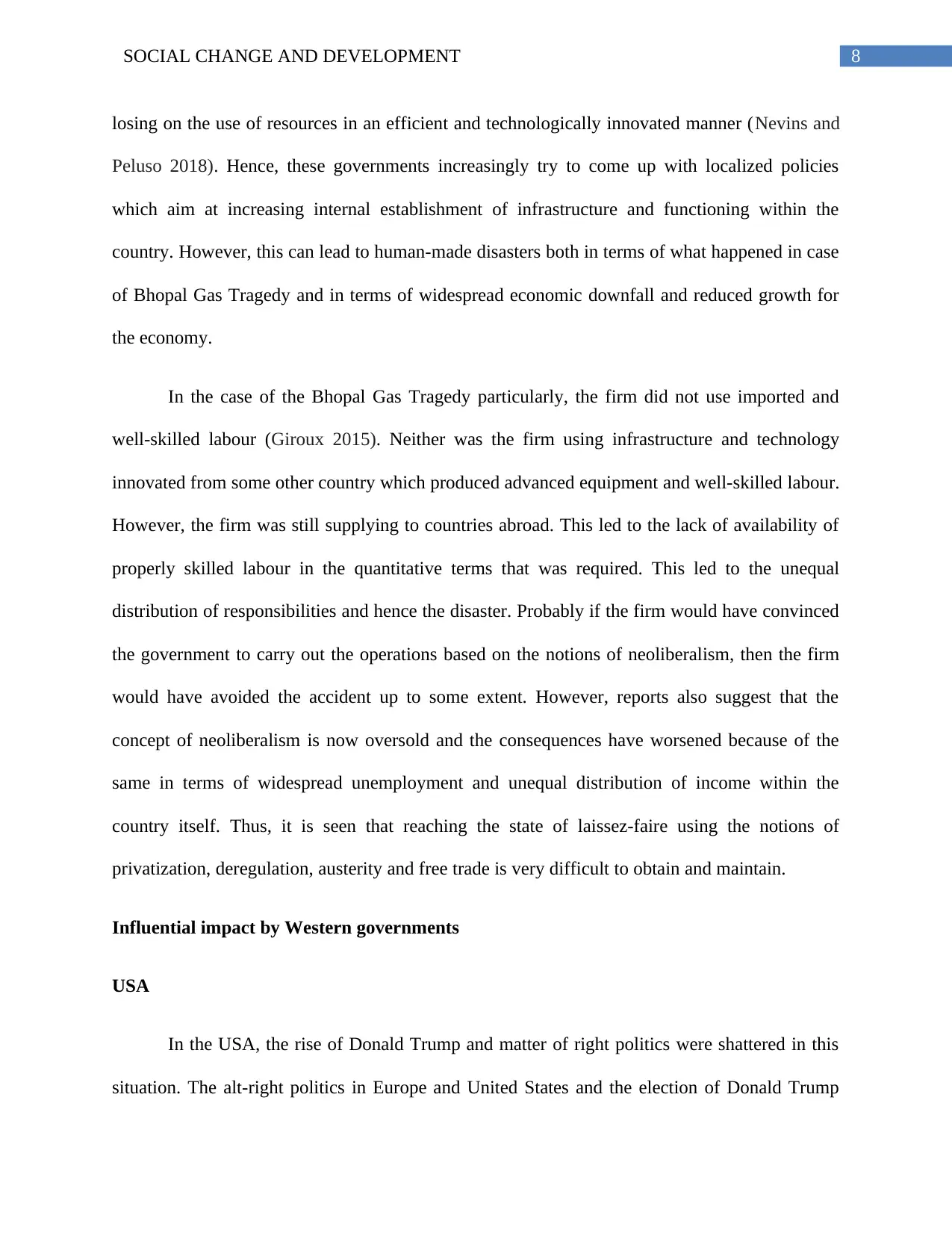
8SOCIAL CHANGE AND DEVELOPMENT
losing on the use of resources in an efficient and technologically innovated manner (Nevins and
Peluso 2018). Hence, these governments increasingly try to come up with localized policies
which aim at increasing internal establishment of infrastructure and functioning within the
country. However, this can lead to human-made disasters both in terms of what happened in case
of Bhopal Gas Tragedy and in terms of widespread economic downfall and reduced growth for
the economy.
In the case of the Bhopal Gas Tragedy particularly, the firm did not use imported and
well-skilled labour (Giroux 2015). Neither was the firm using infrastructure and technology
innovated from some other country which produced advanced equipment and well-skilled labour.
However, the firm was still supplying to countries abroad. This led to the lack of availability of
properly skilled labour in the quantitative terms that was required. This led to the unequal
distribution of responsibilities and hence the disaster. Probably if the firm would have convinced
the government to carry out the operations based on the notions of neoliberalism, then the firm
would have avoided the accident up to some extent. However, reports also suggest that the
concept of neoliberalism is now oversold and the consequences have worsened because of the
same in terms of widespread unemployment and unequal distribution of income within the
country itself. Thus, it is seen that reaching the state of laissez-faire using the notions of
privatization, deregulation, austerity and free trade is very difficult to obtain and maintain.
Influential impact by Western governments
USA
In the USA, the rise of Donald Trump and matter of right politics were shattered in this
situation. The alt-right politics in Europe and United States and the election of Donald Trump
losing on the use of resources in an efficient and technologically innovated manner (Nevins and
Peluso 2018). Hence, these governments increasingly try to come up with localized policies
which aim at increasing internal establishment of infrastructure and functioning within the
country. However, this can lead to human-made disasters both in terms of what happened in case
of Bhopal Gas Tragedy and in terms of widespread economic downfall and reduced growth for
the economy.
In the case of the Bhopal Gas Tragedy particularly, the firm did not use imported and
well-skilled labour (Giroux 2015). Neither was the firm using infrastructure and technology
innovated from some other country which produced advanced equipment and well-skilled labour.
However, the firm was still supplying to countries abroad. This led to the lack of availability of
properly skilled labour in the quantitative terms that was required. This led to the unequal
distribution of responsibilities and hence the disaster. Probably if the firm would have convinced
the government to carry out the operations based on the notions of neoliberalism, then the firm
would have avoided the accident up to some extent. However, reports also suggest that the
concept of neoliberalism is now oversold and the consequences have worsened because of the
same in terms of widespread unemployment and unequal distribution of income within the
country itself. Thus, it is seen that reaching the state of laissez-faire using the notions of
privatization, deregulation, austerity and free trade is very difficult to obtain and maintain.
Influential impact by Western governments
USA
In the USA, the rise of Donald Trump and matter of right politics were shattered in this
situation. The alt-right politics in Europe and United States and the election of Donald Trump
⊘ This is a preview!⊘
Do you want full access?
Subscribe today to unlock all pages.

Trusted by 1+ million students worldwide
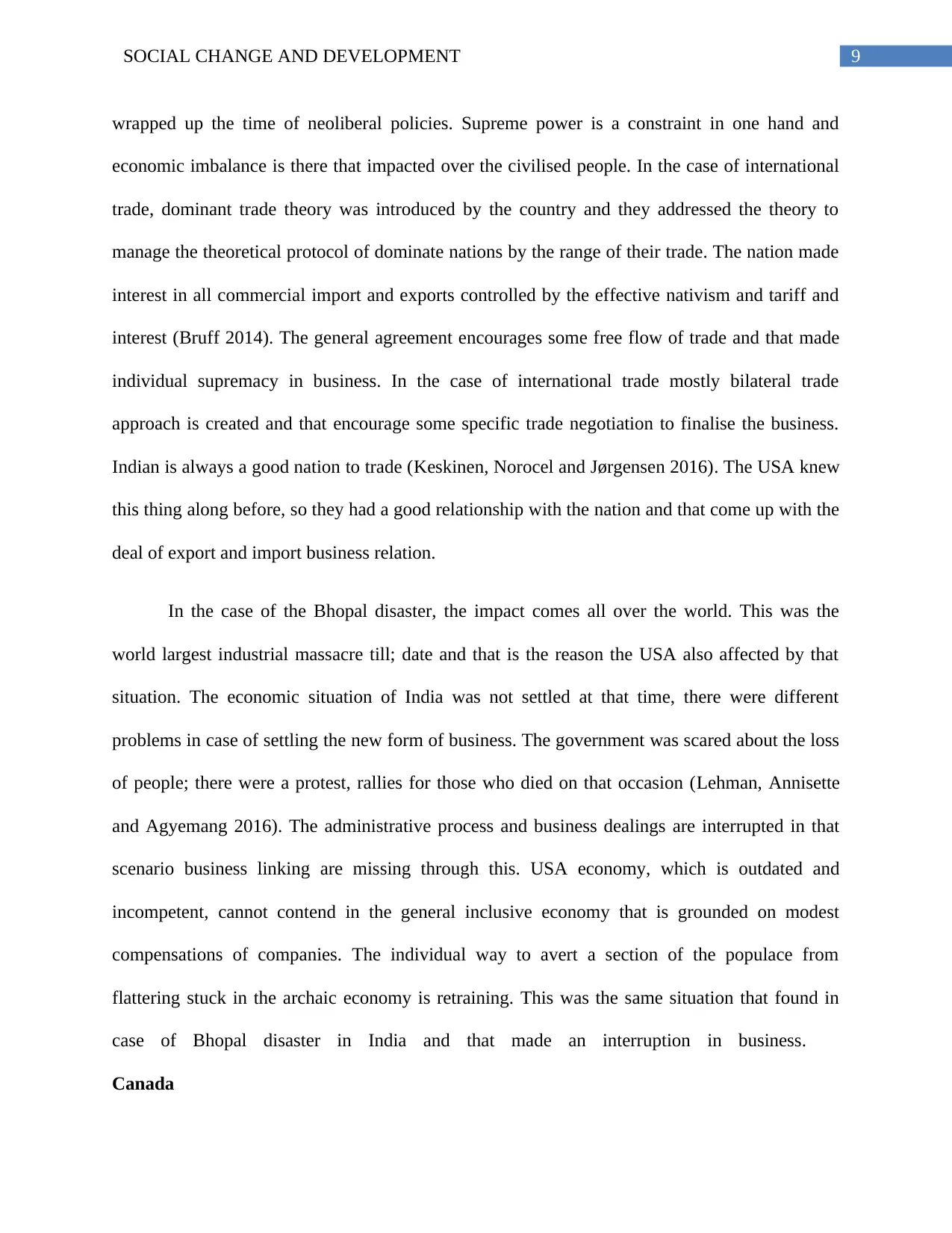
9SOCIAL CHANGE AND DEVELOPMENT
wrapped up the time of neoliberal policies. Supreme power is a constraint in one hand and
economic imbalance is there that impacted over the civilised people. In the case of international
trade, dominant trade theory was introduced by the country and they addressed the theory to
manage the theoretical protocol of dominate nations by the range of their trade. The nation made
interest in all commercial import and exports controlled by the effective nativism and tariff and
interest (Bruff 2014). The general agreement encourages some free flow of trade and that made
individual supremacy in business. In the case of international trade mostly bilateral trade
approach is created and that encourage some specific trade negotiation to finalise the business.
Indian is always a good nation to trade (Keskinen, Norocel and Jørgensen 2016). The USA knew
this thing along before, so they had a good relationship with the nation and that come up with the
deal of export and import business relation.
In the case of the Bhopal disaster, the impact comes all over the world. This was the
world largest industrial massacre till; date and that is the reason the USA also affected by that
situation. The economic situation of India was not settled at that time, there were different
problems in case of settling the new form of business. The government was scared about the loss
of people; there were a protest, rallies for those who died on that occasion (Lehman, Annisette
and Agyemang 2016). The administrative process and business dealings are interrupted in that
scenario business linking are missing through this. USA economy, which is outdated and
incompetent, cannot contend in the general inclusive economy that is grounded on modest
compensations of companies. The individual way to avert a section of the populace from
flattering stuck in the archaic economy is retraining. This was the same situation that found in
case of Bhopal disaster in India and that made an interruption in business.
Canada
wrapped up the time of neoliberal policies. Supreme power is a constraint in one hand and
economic imbalance is there that impacted over the civilised people. In the case of international
trade, dominant trade theory was introduced by the country and they addressed the theory to
manage the theoretical protocol of dominate nations by the range of their trade. The nation made
interest in all commercial import and exports controlled by the effective nativism and tariff and
interest (Bruff 2014). The general agreement encourages some free flow of trade and that made
individual supremacy in business. In the case of international trade mostly bilateral trade
approach is created and that encourage some specific trade negotiation to finalise the business.
Indian is always a good nation to trade (Keskinen, Norocel and Jørgensen 2016). The USA knew
this thing along before, so they had a good relationship with the nation and that come up with the
deal of export and import business relation.
In the case of the Bhopal disaster, the impact comes all over the world. This was the
world largest industrial massacre till; date and that is the reason the USA also affected by that
situation. The economic situation of India was not settled at that time, there were different
problems in case of settling the new form of business. The government was scared about the loss
of people; there were a protest, rallies for those who died on that occasion (Lehman, Annisette
and Agyemang 2016). The administrative process and business dealings are interrupted in that
scenario business linking are missing through this. USA economy, which is outdated and
incompetent, cannot contend in the general inclusive economy that is grounded on modest
compensations of companies. The individual way to avert a section of the populace from
flattering stuck in the archaic economy is retraining. This was the same situation that found in
case of Bhopal disaster in India and that made an interruption in business.
Canada
Paraphrase This Document
Need a fresh take? Get an instant paraphrase of this document with our AI Paraphraser
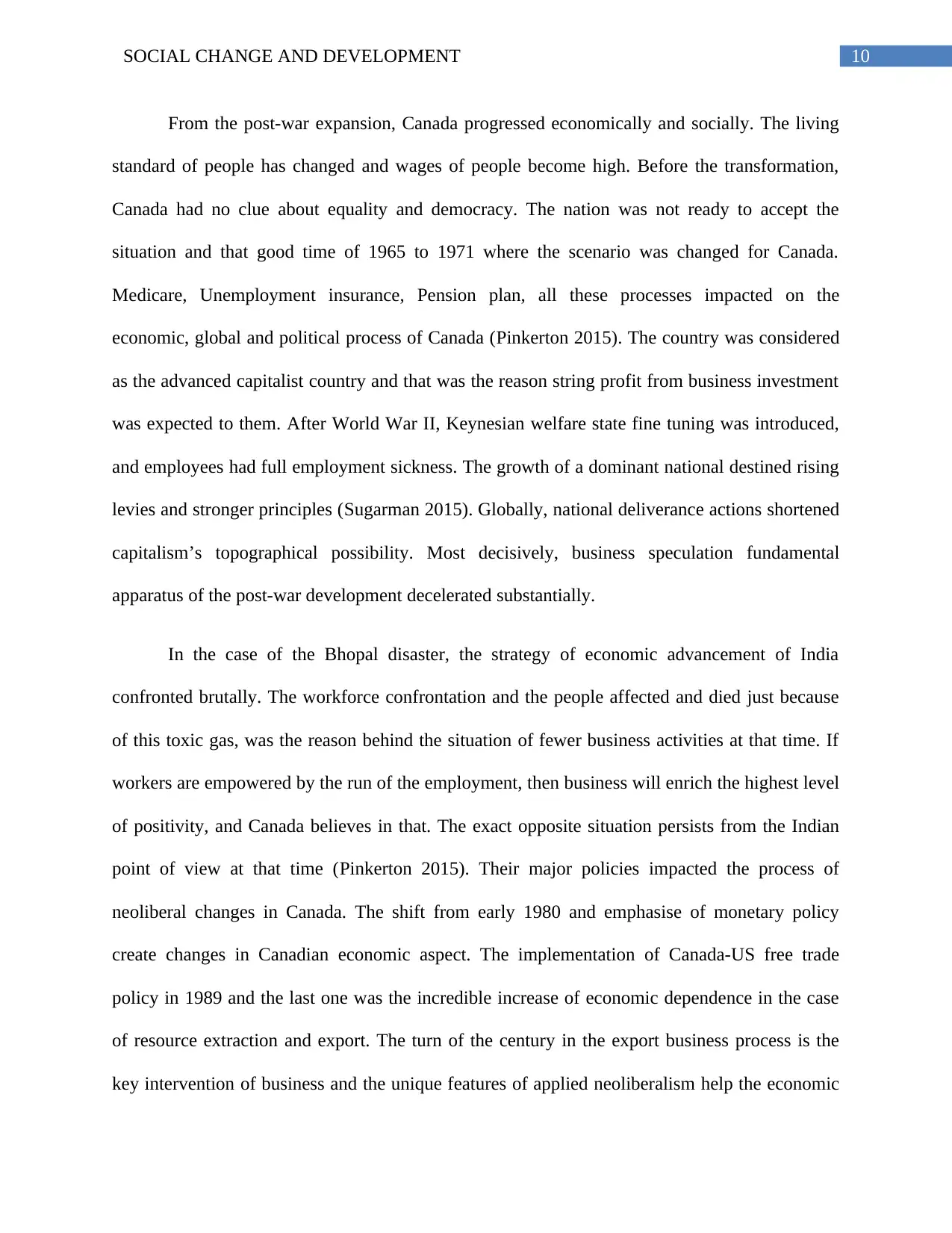
10SOCIAL CHANGE AND DEVELOPMENT
From the post-war expansion, Canada progressed economically and socially. The living
standard of people has changed and wages of people become high. Before the transformation,
Canada had no clue about equality and democracy. The nation was not ready to accept the
situation and that good time of 1965 to 1971 where the scenario was changed for Canada.
Medicare, Unemployment insurance, Pension plan, all these processes impacted on the
economic, global and political process of Canada (Pinkerton 2015). The country was considered
as the advanced capitalist country and that was the reason string profit from business investment
was expected to them. After World War II, Keynesian welfare state fine tuning was introduced,
and employees had full employment sickness. The growth of a dominant national destined rising
levies and stronger principles (Sugarman 2015). Globally, national deliverance actions shortened
capitalism’s topographical possibility. Most decisively, business speculation fundamental
apparatus of the post-war development decelerated substantially.
In the case of the Bhopal disaster, the strategy of economic advancement of India
confronted brutally. The workforce confrontation and the people affected and died just because
of this toxic gas, was the reason behind the situation of fewer business activities at that time. If
workers are empowered by the run of the employment, then business will enrich the highest level
of positivity, and Canada believes in that. The exact opposite situation persists from the Indian
point of view at that time (Pinkerton 2015). Their major policies impacted the process of
neoliberal changes in Canada. The shift from early 1980 and emphasise of monetary policy
create changes in Canadian economic aspect. The implementation of Canada-US free trade
policy in 1989 and the last one was the incredible increase of economic dependence in the case
of resource extraction and export. The turn of the century in the export business process is the
key intervention of business and the unique features of applied neoliberalism help the economic
From the post-war expansion, Canada progressed economically and socially. The living
standard of people has changed and wages of people become high. Before the transformation,
Canada had no clue about equality and democracy. The nation was not ready to accept the
situation and that good time of 1965 to 1971 where the scenario was changed for Canada.
Medicare, Unemployment insurance, Pension plan, all these processes impacted on the
economic, global and political process of Canada (Pinkerton 2015). The country was considered
as the advanced capitalist country and that was the reason string profit from business investment
was expected to them. After World War II, Keynesian welfare state fine tuning was introduced,
and employees had full employment sickness. The growth of a dominant national destined rising
levies and stronger principles (Sugarman 2015). Globally, national deliverance actions shortened
capitalism’s topographical possibility. Most decisively, business speculation fundamental
apparatus of the post-war development decelerated substantially.
In the case of the Bhopal disaster, the strategy of economic advancement of India
confronted brutally. The workforce confrontation and the people affected and died just because
of this toxic gas, was the reason behind the situation of fewer business activities at that time. If
workers are empowered by the run of the employment, then business will enrich the highest level
of positivity, and Canada believes in that. The exact opposite situation persists from the Indian
point of view at that time (Pinkerton 2015). Their major policies impacted the process of
neoliberal changes in Canada. The shift from early 1980 and emphasise of monetary policy
create changes in Canadian economic aspect. The implementation of Canada-US free trade
policy in 1989 and the last one was the incredible increase of economic dependence in the case
of resource extraction and export. The turn of the century in the export business process is the
key intervention of business and the unique features of applied neoliberalism help the economic
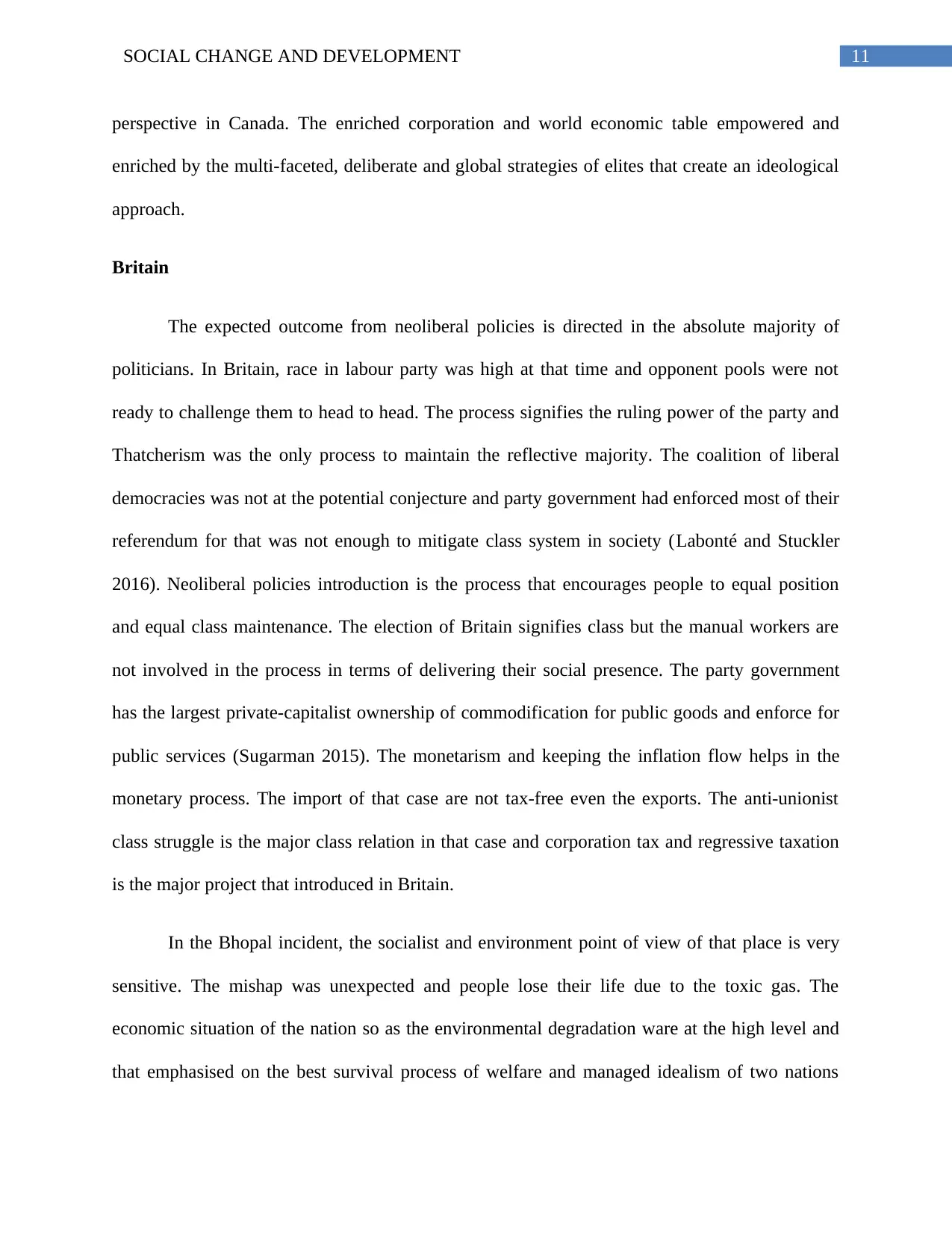
11SOCIAL CHANGE AND DEVELOPMENT
perspective in Canada. The enriched corporation and world economic table empowered and
enriched by the multi-faceted, deliberate and global strategies of elites that create an ideological
approach.
Britain
The expected outcome from neoliberal policies is directed in the absolute majority of
politicians. In Britain, race in labour party was high at that time and opponent pools were not
ready to challenge them to head to head. The process signifies the ruling power of the party and
Thatcherism was the only process to maintain the reflective majority. The coalition of liberal
democracies was not at the potential conjecture and party government had enforced most of their
referendum for that was not enough to mitigate class system in society (Labonté and Stuckler
2016). Neoliberal policies introduction is the process that encourages people to equal position
and equal class maintenance. The election of Britain signifies class but the manual workers are
not involved in the process in terms of delivering their social presence. The party government
has the largest private-capitalist ownership of commodification for public goods and enforce for
public services (Sugarman 2015). The monetarism and keeping the inflation flow helps in the
monetary process. The import of that case are not tax-free even the exports. The anti-unionist
class struggle is the major class relation in that case and corporation tax and regressive taxation
is the major project that introduced in Britain.
In the Bhopal incident, the socialist and environment point of view of that place is very
sensitive. The mishap was unexpected and people lose their life due to the toxic gas. The
economic situation of the nation so as the environmental degradation ware at the high level and
that emphasised on the best survival process of welfare and managed idealism of two nations
perspective in Canada. The enriched corporation and world economic table empowered and
enriched by the multi-faceted, deliberate and global strategies of elites that create an ideological
approach.
Britain
The expected outcome from neoliberal policies is directed in the absolute majority of
politicians. In Britain, race in labour party was high at that time and opponent pools were not
ready to challenge them to head to head. The process signifies the ruling power of the party and
Thatcherism was the only process to maintain the reflective majority. The coalition of liberal
democracies was not at the potential conjecture and party government had enforced most of their
referendum for that was not enough to mitigate class system in society (Labonté and Stuckler
2016). Neoliberal policies introduction is the process that encourages people to equal position
and equal class maintenance. The election of Britain signifies class but the manual workers are
not involved in the process in terms of delivering their social presence. The party government
has the largest private-capitalist ownership of commodification for public goods and enforce for
public services (Sugarman 2015). The monetarism and keeping the inflation flow helps in the
monetary process. The import of that case are not tax-free even the exports. The anti-unionist
class struggle is the major class relation in that case and corporation tax and regressive taxation
is the major project that introduced in Britain.
In the Bhopal incident, the socialist and environment point of view of that place is very
sensitive. The mishap was unexpected and people lose their life due to the toxic gas. The
economic situation of the nation so as the environmental degradation ware at the high level and
that emphasised on the best survival process of welfare and managed idealism of two nations
⊘ This is a preview!⊘
Do you want full access?
Subscribe today to unlock all pages.

Trusted by 1+ million students worldwide
1 out of 16
Related Documents
Your All-in-One AI-Powered Toolkit for Academic Success.
+13062052269
info@desklib.com
Available 24*7 on WhatsApp / Email
![[object Object]](/_next/static/media/star-bottom.7253800d.svg)
Unlock your academic potential
Copyright © 2020–2026 A2Z Services. All Rights Reserved. Developed and managed by ZUCOL.





